Your husky may howl at night due to loneliness, anxiety, or communication. Ensure they have enough exercise and mental stimulation.
| Ancestral Behavior | Huskies are closely related to wolves, for whom howling is a primary form of communication. |
| Separation Anxiety | Up to 20% of dogs suffer from separation anxiety, which can cause them to howl when left alone or at night. |
| Seeking Attention | Huskies often howl to get the attention of their owners or other dogs, especially if they feel ignored. |
| Responding to Noises | Huskies may howl in response to sounds like sirens or other dogs howling, sometimes perceived to be over a mile away. |
| Medical Issues | Pain or discomfort from conditions like ear infections or arthritis can cause a husky to howl. |
| Boredom or Excess Energy | Huskies are very active and require ample exercise; without it, they may howl due to boredom, recommended daily exercise is 30 to 60 minutes. |
| Establishing Territory | Howling can be used to claim territory or to warn others away; this is part of their natural instinct. |
| Environmental Changes | Huskies might howl due to changes in their environment like moving to a new home or changes in the family dynamic. |
Why is my husky howling at night
Husky dogs are known for their strong pack instincts and tendency to howl. Your husky may be howling at night due to loneliness, boredom, or a desire to communicate with other dogs in the area.
Providing regular exercise, mental stimulation, and companionship during the day can help reduce nighttime howling. Additionally, creating a comfortable and safe sleeping area for your husky and using positive reinforcement training to discourage excessive howling can also be effective.
To ensure your husky stays healthy and vibrant, understanding their need for regular activity is crucial. Dive deeper into maintaining your husky's wellbeing with our comprehensive guide, "Husky Exercise Essentials: Keep Your Pet Active."

Common Triggers for Nighttime Howling
Why is my husky howling at night
Huskies are known for their distinctive howling, often triggered by specific stimuli at night. Environmental noises, such as the sound of strong winds, distant sirens, or even the rustling of leaves, can prompt a husky to howl.
Additionally, the presence of other animals, whether in the vicinity or merely catching their scent, can elicit a howling response. These triggers often resonate with the husky’s innate instincts, inherited from their wolf ancestors, to communicate and alert their pack members to potential threats or changes in their surroundings. Sudden and loud noises like fireworks or thunderstorms can also startle a husky, triggering a howling response as a form of expressing unease or distress.
It’s essential to recognize and understand these triggers to address your husky’s nighttime howling effectively. By identifying the specific stimuli that prompt your husky’s howling, you can take steps to minimize their exposure to these triggers and create a more peaceful nighttime environment for your pet..
For a deeper understanding of your husky's nocturnal vocalizations and practical advice on how to manage this behavior, delve into our comprehensive guide. Discover strategies and insights in our article, Uncover the Reasons Behind Your Husky's Howling and transform your nighttime serenades into peaceful silence.

The Role of Loneliness and Separation Anxiety
Huskies are pack animals, and their deep-rooted instinct to be part of a social group makes them prone to loneliness and separation anxiety when left alone. This can manifest in nighttime howling, as they express their distress at being separated from their pack or their human family.
Loneliness and separation anxiety can stem from changes in routine, such as a family member leaving for work or school, or from being left alone for long periods.
This emotional distress can trigger vocalizations as a way for the husky to seek comfort and reaffirm its connection to its pack members.
Why is my husky howling at night
Separation anxiety can also be compounded by factors such as a lack of proper training or inadequate socialization, leading to heightened distress when left alone. Understanding and addressing the emotional needs of a husky is crucial in preventing nighttime howling and ensuring their overall well-being.
For comprehensive insights into your husky's growth and coat development stages, discover the timeline and care tips for when they shed their puppy fur. Uncover essential grooming advice and more at Understanding Husky Puppy Coat Shedding.
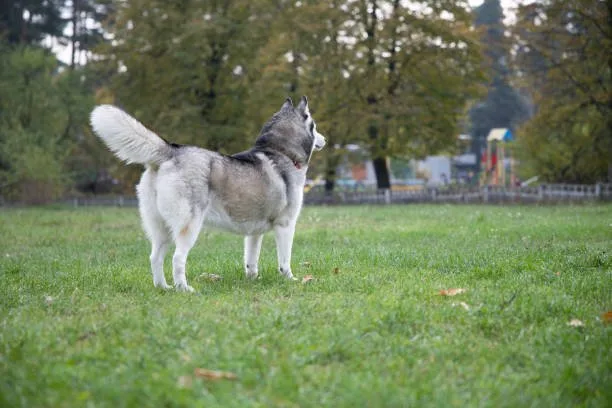
Physical Needs and Nighttime Discomfort
Huskies have specific physical needs that, if unmet, can contribute to their howling at night. When a husky experiences hunger, it may vocalize to communicate its need for food.
Similarly, if it is thirsty, the husky might howl to convey its thirst. In addition, the need to relieve itself could also prompt howling, especially if the husky is confined indoors and unable to access the outdoors for elimination.
It’s essential for husky owners to ensure that their pets’ physical requirements are adequately met, especially before bedtime, to minimize nighttime vocalizations.
Providing access to fresh water and feeding the husky appropriately timed meals can help address hunger and thirst. Additionally, ample opportunities for outdoor bathroom breaks before bedtime can ensure that the husky is comfortable and less likely to howl due to physical discomfort.
Understanding the reasons behind a Husky's howl is just the beginning. To explore engaging ways to keep your furry companion entertained and fulfill their social needs, delve into our comprehensive guide on fun and engaging activities for Huskies.
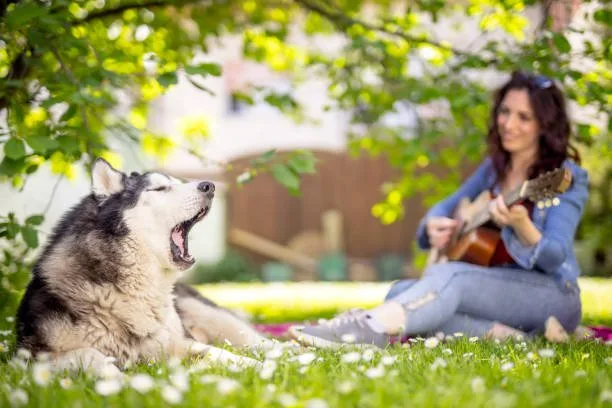
Exercise: A Key to Reduce Howling
Adequate exercise is paramount in preventing nighttime howling in huskies. Huskies are incredibly energetic and require a good amount of physical activity to expend their energy.
Without proper exercise, they may become restless and resort to howling as a way to release pent-up energy.
Regular walks, runs, and engaging playtime are essential to fulfill the husky’s exercise needs. A lack of physical exertion can lead to behavioral issues, including disruptive howling at night.
By ensuring that your husky gets an adequate amount of exercise during the day, you can significantly reduce the likelihood of nighttime howling.
Discover additional insights into Husky behavior and training methods on our dedicated page. Uncover the reasons behind your Husky's interaction with smaller dogs and learn how to apply positive training techniques by visiting "Understanding Husky Behavior: Positive Training for Your Dog."

Mental Stimulation to Curb Boredom
Huskies are highly intelligent and active dogs, requiring mental stimulation to prevent boredom and subsequent howling behavior. Lack of mental engagement can lead to restlessness, especially during the night, prompting a husky to vocalize its discontent.
This begs the question, “Why is my husky howling at night?”
One effective approach to address this issue is by incorporating interactive play and training into your husky’s daily routine. Interactive toys, puzzle feeders, and engaging games provide mental challenges that keep your husky occupied and mentally stimulated.
Training sessions that involve learning new commands or tricks can also channel your husky’s energy in a positive direction, reducing the likelihood of nighttime howling.
American Kennel Club: Why is my husky howling at night
By incorporating mental stimulation activities, husky owners can provide an outlet for their pet’s cognitive needs, thereby minimizing boredom and restless behavior that often manifests as nighttime howling. Understanding the significance of mental enrichment can significantly contribute to a quieter and more content husky during the night.
To delve deeper into ensuring your canine companion's well-being, explore our detailed guide on optimal exercise routines for huskies. Discover the key to a balanced and happy pet by visiting "Husky Exercise Essentials: Keeping Your Dog Vibrant and Healthy."
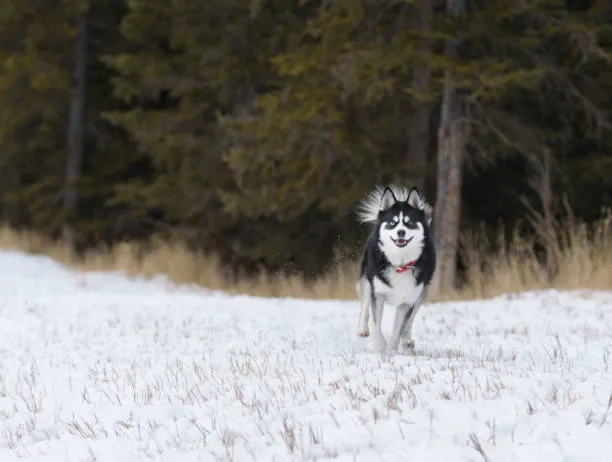
Creating a Comforting Evening Routine
Creating a comforting evening routine for your husky is essential for providing a sense of security and minimizing nighttime howling. Begin by establishing a consistent schedule for meals, walks, and playtime in the evening to help your husky anticipate and look forward to winding down for the night.
This predictability can reassure your pet and reduce anxiety, which often leads to howling.
Reddit Why is my husky howling at night
Another crucial element is to incorporate calming activities, such as gentle brushing or massage, into the evening routine. This can help your husky relax and associate nighttime with peaceful, positive experiences.
Additionally, consider creating a cozy, den-like sleeping area for your husky, perhaps with a comfortable bed and a favorite blanket or toy. Providing a designated, secure space can alleviate any unease and promote a restful night.
Ensuring your husky is well-rested is just part of their overall well-being. Learn about proper feeding intervals and nutritional advice for your husky to complement their bedtime routine with a balanced diet.
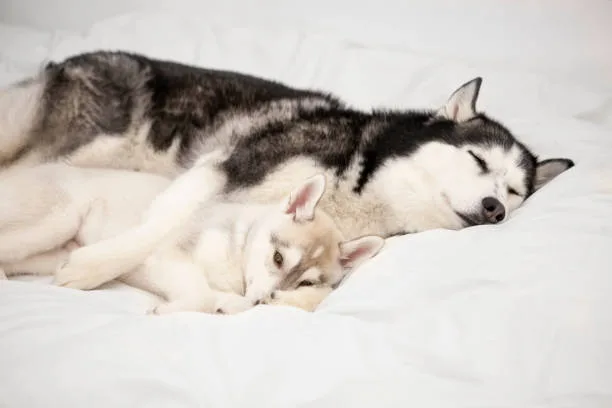
When to Seek Professional Help
Persistent howling can be concerning for husky owners, and in some cases, seeking professional help is the best course of action to address the problem. If your husky’s nighttime howling persists despite implementing various strategies, it may be indicative of an underlying issue that requires expert intervention.
Signs that warrant seeking professional help include excessive and unexplained howling that disrupts both your husky’s well-being and your household’s peace.
Additionally, if the howling is accompanied by other behavioral changes, such as aggressiveness, withdrawal, or loss of appetite, it could be a manifestation of an underlying health or psychological issue that necessitates professional assessment.
Moreover, if your husky’s howling is a result of separation anxiety or extreme distress when left alone at night, consulting with a qualified dog behaviorist or veterinarian can provide you with specialized guidance and support tailored to your husky’s specific needs. These professionals can conduct a comprehensive assessment to determine the root cause of the howling and formulate an effective treatment plan to alleviate the issue.
On Quora about: Why is my husky howling at night
Remember, seeking professional help is not a sign of failure as a pet owner.
Rather, it demonstrates your commitment to ensuring the well-being of your husky and addressing their needs in a holistic manner. By identifying and addressing the underlying reasons for your husky’s nighttime howling with the assistance of a professional, you can work towards creating a peaceful and harmonious environment for both your pet and your household.
If your canine companion's behavior is causing concern, seeking guidance from a trusted specialist is essential. For more insight into the health and care of your female Husky, delve into our comprehensive article on their estrous cycle: Understanding Female Husky Reproductive Health.
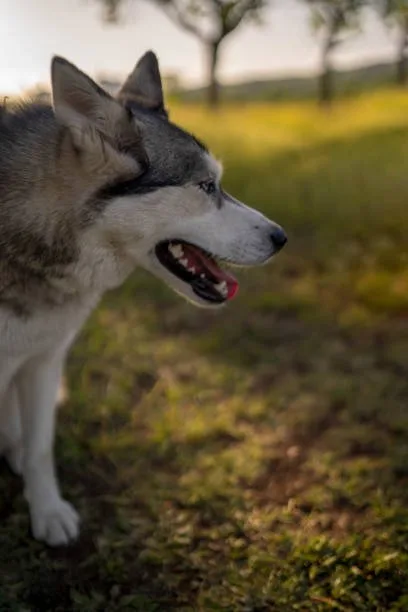
Positive Reinforcement for Quiet Nights
Positive reinforcement is a powerful tool for shaping your husky’s nighttime behavior. By rewarding moments of quiet and calmness during the night, you can effectively encourage desirable behavior.
Consistent use of positive reinforcement helps your husky associate peaceful behavior with pleasurable outcomes, strengthening the likelihood of repetition.
One effective method is to use treats as rewards for quiet nights. When your husky refrains from howling or barking during the night, offer a small, special treat as a form of positive reinforcement.
This creates a positive association with being silent and reinforces the behavior you want to see.
Another approach is to use verbal praise and gentle petting when your husky remains quiet at night. Verbal affirmations such as “good quiet” or “well done” accompanied by gentle strokes can send a clear message that silence is appreciated and rewarded.
On Medium about: Why is my husky howling at night
Consistency is key in positive reinforcement training.
Regularly acknowledging and rewarding moments of quiet behavior will help your husky understand the desired nighttime conduct. It’s important to remain patient and committed to the process, as it may take time for your husky to fully grasp the concept.
To delve deeper into understanding and managing your pet's needs, explore our extensive guide on bearded dragon brumation, a crucial aspect for any reptile enthusiast. Transition smoothly from training your husky to learning more about effective brumation practices for your bearded dragon.
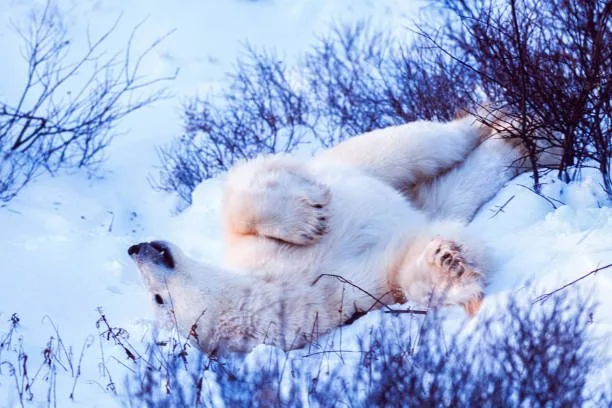
Deciphering Husky Vocalization Patterns
Huskies are known for their distinctive vocalizations that can convey various messages and emotions. Understanding their vocalization patterns is crucial for deciphering their needs and ensuring their well-being.
Huskies are predisposed to expressive howling, which is deeply rooted in their wolf ancestry. It’s important to recognize that howling is a natural form of communication for huskies, allowing them to convey their emotions, ranging from excitement to distress. Husky vocalization goes beyond howling and can include whining, grumbling, and even “talking.” Each of these sounds carries a specific meaning, and deciphering these vocal patterns is essential for pet owners.
For example, high-pitched, repetitive howling may signal distress or loneliness, while playful “talking” can indicate a desire for interaction. Recognizing the breed-specific tendencies towards certain sounds enables owners to differentiate between normal communication and distress signals. By understanding these nuances, owners can respond appropriately to their husky’s needs, providing comfort and support when necessary. Additionally, being able to interpret vocalization patterns allows owners to gauge their pet’s emotional state.
This understanding fosters a stronger bond between the owner and the husky, leading to better care and a deeper connection. In summary, understanding husky vocalization patterns is vital for comprehending the messages behind their howling and other sounds. It empowers owners to discern normal communication from distress signals, facilitating better responsiveness to their pet’s needs and emotional states..

Strategies for Anxiety Reduction and Howling Prevention
Huskies are sensitive animals that can experience anxiety, leading to nocturnal howling. To reduce anxiety and prevent nighttime vocalizations, various strategies can be employed for their well-being.
- Establishing a consistent routine is crucial for huskies, as it provides a sense of security and predictability.
This includes feeding, exercise, and bedtime, which helps in minimizing anxiety and creating a calming environment for the night.
- Proper exercise is essential for huskies to expel excess energy and to keep them mentally and physically stimulated. Regular, vigorous exercise during the day can promote a more peaceful night’s rest by reducing restlessness and the urge to vocalize.
- Offering mental stimulation through activities like interactive play, training, and puzzle toys can engage a husky’s mind, alleviating boredom and anxiety.
Mental stimulation is equally important as physical activity in keeping a husky content and less likely to howl at night.
By employing these comprehensive approaches, husky owners can create an environment that promotes relaxation and reduces anxiety, thereby preventing nocturnal howling and ensuring a peaceful night for both the husky and the household.
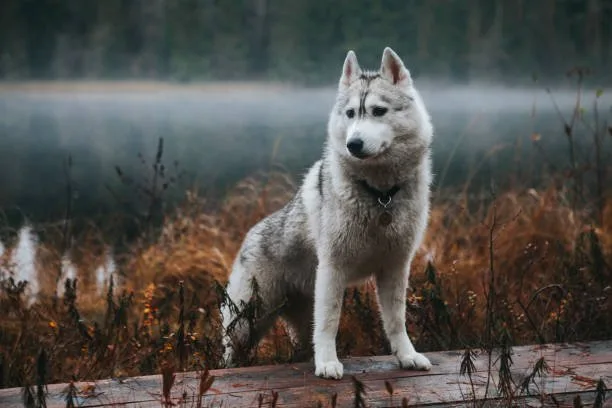
Enhancing Nighttime Quiet with Environmental Enrichment
Huskies, with their high energy levels and intelligence, require environmental enrichment to prevent boredom-related howling at night. Providing interactive toys such as puzzle feeders, chew toys, and treat-dispensing games can keep them mentally stimulated and engaged, reducing the likelihood of nighttime vocalizations.
These toys not only provide physical activity but also offer mental challenges, helping to curb any restlessness that may lead to howling.
In addition to toys, utilizing noise-cancellation methods can create a more serene environment for your husky during the night. This can include background white noise or calming music to mask external sounds that may trigger howling.
By reducing the sensitivity to environmental noises, you can help your husky stay calm and less inclined to vocalize excessively during the nighttime hours.
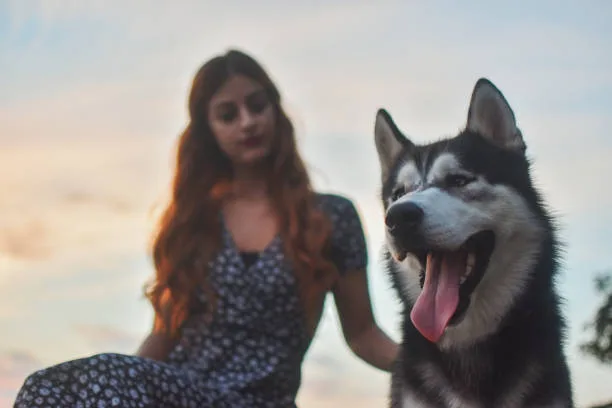
Importance of Canine Socialization and Owner-Dog Bonding
To address “Why is my husky howling at night,” it’s crucial to emphasize the significance of canine socialization and owner-dog bonding. Huskies, being social animals, thrive on interactions with other dogs and their human companions.
Ensuring adequate socialization opportunities for your husky can positively impact their emotional well-being and potentially reduce nighttime howling. Creating a strong bond with your husky through regular positive interactions, engaging activities, and consistent training can help foster a sense of security and comfort, mitigating any separation anxiety that may contribute to nighttime vocalizations. Additionally, providing avenues for socialization, such as visits to dog parks or organized play dates with other friendly dogs, can offer mental stimulation and companionship, further contributing to your husky’s overall contentment. By actively participating in their social experiences, you play a vital role in establishing a sense of trust and reassurance for your husky, potentially minimizing any distress that could lead to disruptive howling at night.
Strong owner-dog bonding also aids in establishing a calming routine, reinforcing the association of nighttime with security and peace. In summary, this section highlights the positive impact of canine socialization and owner-dog bonding on a husky’s nighttime behavior. It outlines techniques for fostering social interactions and strengthening the bond, ultimately promoting better sleep and reducing separation anxiety for your beloved husky..
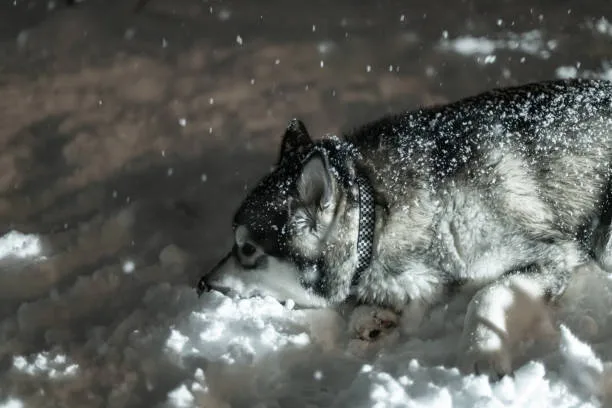
Navigating Legal and Practical Aspects of Husky Howling
When living in a community, it’s essential to consider the legal and practical aspects of managing a husky’s nighttime howling. Understanding noise ordinances and neighborly courtesy is crucial to ensure a harmonious environment for everyone.
It’s important to address excessive howling through positive reinforcement training methods.
Encouraging quiet behavior and rewarding it can significantly reduce noise disturbances while promoting a calm environment.
Additionally, creating a comfortable and secure space for your husky to rest in, such as a cozy crate or designated sleeping area, can help mitigate nighttime vocalizations. Ensuring that the environment is conducive to relaxation can go a long way in minimizing disturbances to neighbors.
Moreover, being mindful of the time when engaging in activities with your husky can also make a significant difference.
Planning walks and playtime earlier in the evening can help tire out your husky, potentially reducing the likelihood of excessive vocalizations during the night.
Lastly, seeking advice from a professional dog behaviorist or trainer can provide valuable insights into managing your husky’s howling within the confines of legal requirements and community standards. It’s important to prioritize your husky’s well-being while respecting the peace and comfort of those around you.
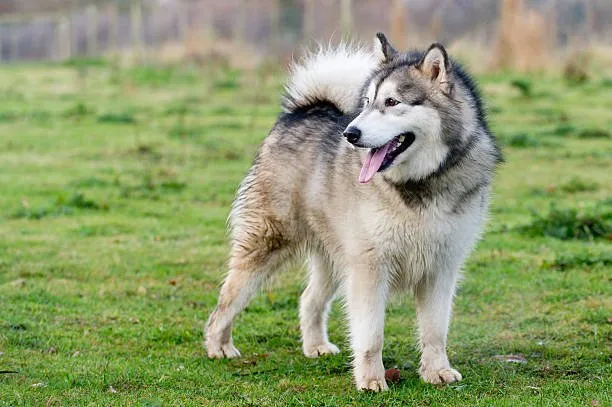
Conclusion: Ensuring Your Husky's Nighttime Well-being
Understanding and addressing the reasons behind a husky’s nighttime howling is crucial for ensuring your pet’s well-being. By identifying the triggers and factors contributing to the howling behavior, you can take proactive steps to provide the necessary care and training.
Proper care involves meeting your husky’s physical and emotional needs, including providing ample exercise, mental stimulation, and a comforting evening routine.
Training plays a vital role in teaching your husky to be calm and quiet at night, using positive reinforcement to reinforce desirable behaviors.
By prioritizing your husky’s nighttime well-being, you create a harmonious and peaceful environment for both your pet and your household, fostering a strong and positive bond with your husky.

Leave a Reply